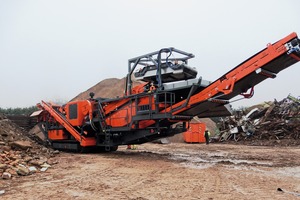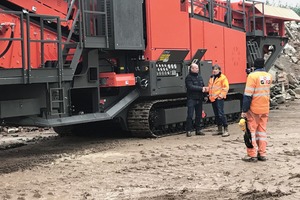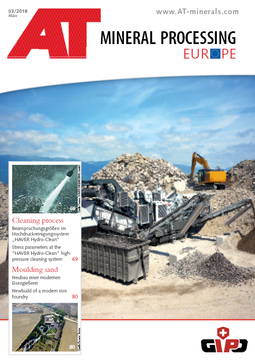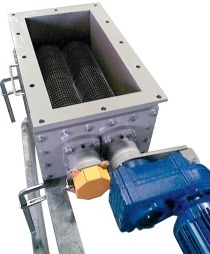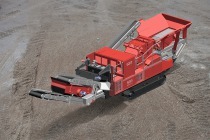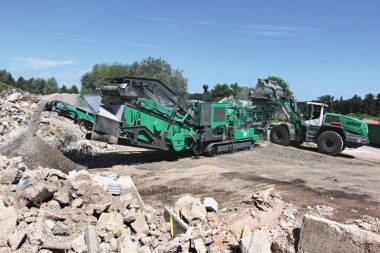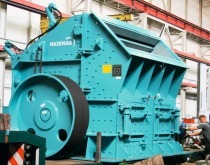Combined processing plant produces tennis court surfaces
The holding company has diverse business streams. Besides demolition work, another focus is the production of high-grade ceramic aggregates and tamped concrete. Besides the material for tennis courts, the company produces stacking blocks and granulate for road construction. The recycling company now managed in the second generation has acquired a supra-regional reputation amongst other things with the production of refractory minerals. Used chamotte is first reduced in a precrusher to a suitable size of 200 mm before being crushed down to 1 mm and screened. With the material, new oven or chamotte bricks are then produced.
With the recycling of old tiles and ceramics, the company has a second mainstay: With impact or hammer mills, particle sizes of the used material up to 1 mm are produced to return these to the ceramic industry production cycle. This applies especially to ceramic reject firings that can then be reused in this way.
For all demolition and earth work, over the years impact crusher technologies have been used, but over time these have not been able to meet the company‘s performance requirements. At last year‘s Steinexpo in Homberg/Ohm, the Swiss crusher manufacturer GIPO was able to attract the attention of the management with its large-size GIPOKOMBI 130 FDR impact crusher on show at the trade fair.
Contract awarded for Swiss precision engineering
The track-mounted impact mill impresses visually with its total weight of 92 t – the rotor diameter alone measures 1300 mm. The machine is so heavy because it is equipped with an active pre- as well as a re-screening unit. The re-screening unit is a double-deck screen measuring 1.80 x 5.50 m, with which up to three products can be screened. With consideration of the additional pre-screen, there is even the option for four products. Besides recirculation of the oversize, an air classifier is on board, which blows all impurities out of the screened material. Low-gravity materials such as plastics or wood are removed from the processing cycle from the start.
The new innovative crusher direct drive of the combined system has a reduced fuel consumption. Whereas with comparable systems, activating the direct drive consumes 70 l diesel straightaway, the GIPOKOMBI 130 FDR only needs 35 – 40 l diesel fuel. With a fuel saving by an average of 30 l per operating hour and average working hours of 1500 h/a, the economic advantage is enormous. The Perfect Tennismehl & Sportgeräte GmbH management team therefore attached great importance to an economic diesel-hydraulic direct drive to eliminate impact crusher electric breakdowns or faults, which can happen with diesel-electric drives.
In the recycling process (0/45 sizes), the processing capacity of the new system is up to 300 t/h, for natural rock much higher still. For the Thijssen Emans & Co. B.V. group of companies, an average of 180 t/h is the target. The company attaches great value to producing high-quality products on schedule.
The machine works with two rockers, one as precrusher and the other as the main crusher. Theoretically, it would even have been possible to integrate a third impact rocker with suitable grinding track if the production of chippings had been planned.
Different tasks – optimum performance
The forecast operating cost advantage as well as the promising improvement in performance made the decision easier for Perfect Tennismehl & Sportgeräte GmbH. Within just 10 weeks after the order had been placed, the new GIPO system was standing on the yard. All frame and chassis parts, vibrating chutes, screens, power pack as well as crusher and rotor are manufactured exclusively at the site of the parent company in Switzerland. All parts are always available.
From Switzerland, the 80-t crusher, the magnet unit with frame (7 t) and the side belt for the prescreen were dispatched separately. After a good two days and a set-up time of just one hour, the machine in the livery colours of Thijssen Emans & Co. B.V. was ready for use. The quality of the first results immediately met the high requirements of the company in the border region. As in the Netherlands, the standards for recycled products are even higher than in Germany, the management was pleasantly surprised at the commissioning.
Impact bars, screen media, other replacement parts and service maintenance will in future be supplied and performed by Apex Fördertechnik. As all replacement parts from Switzerland have to go through customs, support from the GIPO distributor covering the whole of Germany (excluding Bavaria/Baden-Württemberg) was the obvious option.
//www.apex-foerdertechnik.de" target="_blank" >www.apex-foerdertechnik.de:www.apex-foerdertechnik.de


